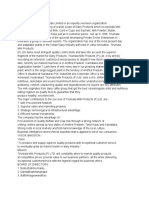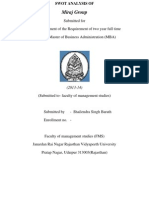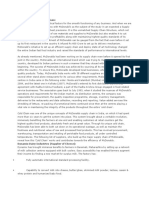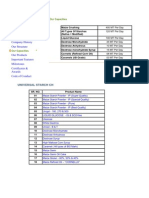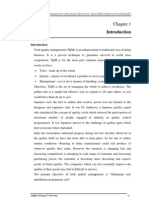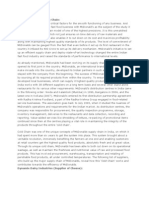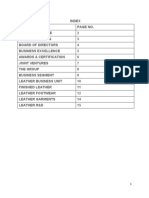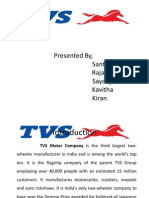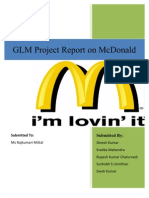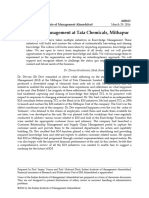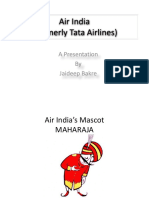Tata Steel: Mr. Partha Sengupta Vice President, Raw Materials
Tata Steel: Mr. Partha Sengupta Vice President, Raw Materials
Uploaded by
binumalhotraCopyright:
Available Formats
Tata Steel: Mr. Partha Sengupta Vice President, Raw Materials
Tata Steel: Mr. Partha Sengupta Vice President, Raw Materials
Uploaded by
binumalhotraOriginal Title
Copyright
Available Formats
Share this document
Did you find this document useful?
Is this content inappropriate?
Copyright:
Available Formats
Tata Steel: Mr. Partha Sengupta Vice President, Raw Materials
Tata Steel: Mr. Partha Sengupta Vice President, Raw Materials
Uploaded by
binumalhotraCopyright:
Available Formats
TATA STEEL
Mr. Partha Sengupta Vice President, Raw Materials Mr. Partha Sengupta, has been appointed Vice President (Raw Materials) at Tata Steel Ltd. from 1st April 2010. He had joined the Company as a Graduate Trainee in 1980.
More
A metallurgist from IT, BHU, Mr. Sengupta has had the experience of contributing to diverse departments of Tata Steel since he joined the Company. After stints in R & D and Scientific Services, he was transferred to Marketing Division in 1991, where he worked till 1995. Thereafter, Mr. Sengupta served as a Commercial Manager in MD's office, Kolkata. In 1996, he took charge to re-structure the Order Fulfillment Process as Head of the Customer Order Management Department. He was then involved in re-engineering the outbound supply chain and creation of Customer Service Division, which he headed as Chief till 2002.
In 2002, Mr. Partha Sengupta moved to Mumbai in Tata Special Steel Limited, the largest manufacturer of steel wires in the country. He supervised its merger into Tata Steel and was placed as the Executive-in-Charge of Wire Division in 2003. In 2005, Mr. Sengupta took over as the Principal Executive Officer to the Managing Director. While carrying forward the responsibility of being the PEO of the Company, Mr. Sengupta was given additional charge of overseeing the Jharkhand Steel Project. In 2007, Mr. Sengupta took over as Vice President (Corporate Services), Tata Steel and worked relentlessly to take all areas under his supervision to greater heights. As VP Raw Materials, Mr. Sengupta is in charge of not only the existing Raw Materials Division but also of Global Minerals, Natural Resources Division, Raw Materials Strategy Group and S&T Mining Project.
He was appointed Chairman of ISWP in 2008. He is a Director of the JUSCO Board and Tata Pigments Limited. He has also been appointed as Chairman of CII - Jharkhand Council in 2008.
An able and proficient multi tasker, with an eye for perfection, Mr. Sengupta has not only lived up to the expectations of his team as a leader and team member but has also created high standards of work culture. His keen business acumen and result oriented approach has made him excel in executing challenging assignments and responsibilities entrusted upon him. In addition to excelling professionally in all fields assigned to him, Mr. Sengupta has undergone extensive training in various Institutions around the world like INSEAD, France.
With an illustrious career spanning across 28 years, Mr. Sengupta is held in high esteem professionally amongst his peers. A widely travelled person, Mr. Sengupta plays an active role in promoting cultural activities. Apart from being an avid reader, he is also passionate about sports.
ITC ; corporate management team
RAMASWAMY
T V Ramaswamy heads Research & Development for the Company. He is also responsible for overall supervision of Environment, Health and Safety. In addition, he is in charge of the Central Projects Organisation. Prior to this Ramaswamy was the Chief Operating Officer of the Cigarette Brands and Supply Chain of the Tobacco Division. After completing his graduation in Engineering from the then Madras University and post graduation in Management from Jamnalal Bajaj Institute of Management Studies, Ramaswamy joined ITC as a Management Pupil in 1974 in the Technical Function. During his tenure in the Company, he has handled a wide range of responsibilities in Operations across India and has also managed the Tobacco Division's R&D from 1992 to 1996. Thereafter, he was the Managing Director of Surya Tobacco Co. Pvt Ltd (now known as Surya Nepal Pvt Ltd) till 2001. He is the Chairman of ITC Filtrona Ltd. He is also a Trustee of ITC's Superannuation Funds.
ITC http://www.itc-iltd.com/Tobacco/ManageContent/ContentView.aspx?ContentID=6
Sourcing the right tobaccos: Our competitive edge is in the timely delivery of quality tobaccos at a competitive price. A team of trained buyers buy the requisite quality and quantity of tobaccos on behest of customers, either through auctions (Flue Cured) or at the farm-gate (non-Flue Cured). We buy the run-of-the-crop, which is a key enabler for our scale and scope value proposition to our customer. Our seasoned buyers, with their domain knowledge and understanding, handle procurement based on customer specific product requirements. We are ably supported by a dedicated pool of suppliers, who specialize in procuring niche styles to cater to specific customer requirements. Our inventory of over 100 M. Kg. is also leveraged from time to time to meet off-season customer needs, making it possible for us to offer a variety of tobaccos all round the year.
McDonalds India Supply Chain: Supply Chain is one of the critical factors for the smooth functioning of any business. And when we are talking about fast food business with McDonald's as the subject of the study it can expected a Supply Chain model of one of the highest precisions. It is this unmatched Supply Chain Structure, which not just ensures on time delivery of raw materials and supplies to McDonalds but also enables it to cut down on its cost and maximize profitability along with maintaining highest quality standards of its products. The level of commitment of McDonalds can be gauged from the fact that even before it set up its first restaurant in the country it infused Rs 400 Crore to set up its delivery mechanism. McDonald's initiative to set up an efficient supply chain and deploy state-of-art technology changed the entire Indian fast food industry and raised the standards of performance to international levels. Related Articles Business Inventory and Supply Chain Management A Level Geography: McDonalds and Sustainable Food Supplies McDonald's offers customers McDonald's Board: Say no to cage-free hens As already mentioned, McDonalds had been working on its supply chain even before it opened its first joint in the country. McDonalds, an international brand which was trying to make inroads into the country, developed its Indian partners in such a manner that they stayed with the company from the beginning. The success of McDonalds India was achieved by sourcing all its required products from within the country. To ensure this, McDonalds developed local businesses, which can supply it highest quality products. Today, McDonalds India works with 38 different suppliers on a long term basis and several other stand alone restaurants for its various other requirements. McDonald's
distribution centres in India came in the following order: Noida and Kalamboli (Mumbai) in 1996, Bangalore in 2004, and the latest one in Kolkata (2007). McDonald's entered its first distribution partnership agreement with Radha Krishna Foodland, a part of the Radha Krishna Group engaged in food-related service businesses. The association goes back to July 1993, when it studied the nuances of McDonald's operations and requirements for the Indian market. As distribution centres, the company was responsible for procurement, the quality inspection programme, storage, inventory management, deliveries to the restaurants and data collection, recording and reporting. Value-added services like shredding of lettuce, re-packing of promotional items continued since then at the centres playing a vital role in maintaining the integrity of the products throughout the entire 'cold chain'. Cold Chain was one of the unique concepts of McDonalds supply chain in India, on which it had spent more than six years to get the system into place. This system brought about a veritable revolution, immensely benefiting the farmers at one end and enabling customers at retail counters get the highest quality food products, absolutely fresh and at great value. Through its unique cold chain, McDonalds has been able to both cut down on its operational wastage, as well as maintain the freshness and nutritional value of raw and processed food products. This has involved procurement, warehousing, transportation and retailing of perishable food products, all under controlled temperatures. The following list of suppliers, who build up the major supply chain of McDonalds, reveal how this Cold Chain' works and contributes towards the efficiency of McDonalds. Dynamix Dairy Industries (Supplier of Cheese): Dynamix has brought immense benefits to farmers in Baramati, Maharashtra by setting up a network of milk collection centres equipped with bulk coolers. Easy accessibility has enabled farmers augment their income by finding a new market for surplus milk. The factory has:
Fully automatic international standard processing facility.
Capability to convert milk into cheese, butter/ghee, skimmed milk powder, lactose, casein & whey protein and humanized baby food.
Stringent quality control measures and continuous Research & Development
From farm two degrees Celsius in 90 minutes is the first step to quality. For example, the Rs 262crore Dynamix Dairy Industries, located in Baramati in Pune district of Maharashtra, manufactures cheese slices for McDonald's at 10 metric tonnes per month. Dynamix has helped set up 15 bulk
cooling centres throughout the district from which it purchases milk. Each cooling centre, which is equipped with modern measuring and testing equipment and a large cooling tank, is not more than a few kilometers away from local dairy farms. A farmer can deliver milk even twice a day on his bicycle and get a printed receipt on the spot, which also lists the quality of the milk supplied by him as per fat content, colour and solids content. If the milk is sub-standard or adulterated, it is rejected on the spot. A batch of milk can vary from one litre to 10 litres, or more. Each batch is mixed in one large stainless steel cooler and chilled immediately to two degrees Celsius to stop bacterial growth and preserve freshness. From this point onwards, until just before the burger is actually served in a McDonald's restaurant hundreds of kilometers away, the temperature is never allowed to increase. When the refrigerated milk arrives at the Dynamix plant at Baramati, the milk in every single tanker is thoroughly tested and rejected if found sub-standard, adulterated or contaminated. The sophisticated testing lab can check fat content with an accuracy of 0.1 per cent. It can even detect minute traces of pesticides or antibiotics administered to cows. This instant feedback and the rejection of the entire tanker-load forces farmers to follow the best practices in terms of animal husbandry, use proper feeds, cut down on the indiscriminate use of pesticides and animal medicines and completely stop even the slightest attempts at adulteration. Trikaya Agriculture (Supplier of Iceberg Lettuce): Implementation of advanced agricultural practices has enabled Trikaya to successfully grow specialty crops like iceberg lettuce, special herbs and many oriental vegetables. Farm infrastructure features:
A specialized nursery with a team of agricultural experts.
Drip and sprinkler irrigation in raised farm beds with fertilizer mixing plant.
Pre-cooling room and a large cold room for post harvest handling.
Refrigerated truck for transportation.
Trikaya Agriculture, a major supplier of iceberg lettuce to McDonald's India, is one such enterprise that is an intrinsic part of the cold chain. Exposure to better agricultural management practices and sharing of advanced agricultural technology by McDonald's has made Trikaya Agriculture extremely conscious of delivering its products with utmost care and quality. Initially lettuce could only be grown
during the winter months but with McDonald's expertise in the area of agriculture, Trikaya Farms in Talegaon, Maharashtra, is now able to grow this crop all the year round. McDonald's has provided assistance in the selection of high quality seeds, exposed the farms to advanced drip-irrigation technology, and helped develop a refrigerated transportation system allowing a small agri-business in Maharashtra to provide fresh, high-quality lettuce to McDonald's urban restaurant locations thousands of kilometers away. Post harvest facilities at Trikaya include a cold chain consisting of a pre-cooling room to remove field heat, a large cold room and a refrigerated van for transportation where the temperature and the relative humidity of the crop is maintained between 1 C and 4 C and 95% respectively. Vegetables are moved into the pre-cooling room within half an hour of harvesting. The pre-cooling room ensures rapid vacuum cooling to 2 C within 90 minutes. The pack house, pre-cooling and cold room are located at the farms itself, ensuring no delay between harvesting, pre-cooling, packaging and cold storage. With this cold chain infrastructure in place, Trikaya Agriculture has also a plan to export this high value product to other international markets, especially to McDonald's Middle East and Asia Pacific operations. McDonald's expertise in packaging, handling and long-distance transportation has helped Trikaya to do trial shipments to the Gulf successfully. In addition to export, McDonald's assistance has enabled Trikaya Agriculture to supply this crop to a number of star-rated hotels, clubs, flight kitchens and offshore catering companies all over India.
AdChoices
Vista Processed Foods Pvt. Ltd. (Supplier of Chicken and Vegetable range of products including Fruit Pies) A joint venture with OSI Industries Inc., USA, McDonald's India Pvt. Ltd. and Vista Processed Foods Pvt. Ltd., produces a range of frozen chicken and vegetable foods. A world class infrastructure at their plant at Taloja, Maharashtra, has:
Separate processing lines for chicken and vegetable foods.
Capability to produce frozen foods at temperature as low as -35 Degree Cel. to retain total freshness.
International standards, procedures and support services.
Vista Processed Foods Pvt. Ltd., McDonald's suppliers for the chicken and vegetable range of products, is another important player in this cold chain. Technical and financial support extended by OSI Industries Inc., USA and McDonald's India Private Limited have enabled Vista to set up worldclass infrastructure and support services. This includes hi-tech refrigeration plants for manufacture of frozen food at temperatures as low as - 35 C. This is vital to ensure that the frozen food retains it freshness for a long time and the 'cold chain' is maintained. The frozen product is immediately moved to cold storage rooms. With continued assistance from its international partners, Vista has installed hi-tech equipment for both the chicken and vegetable processing lines, which reflect the latest food processing technology (de-boning, blending, forming, coating, frying and freezing). For the vegetable range, the latest vegetable mixers and blenders are in operation. Also, keeping cultural sensitivities in mind, both processing lines are absolutely segregated and utmost care is taken to ensure that the vegetable products do not mix with the non-vegetarian products. Now, at Vista, a very wide range of frozen and nutritious chicken and vegetable products is available. Ongoing R&D, both locally and in the parent companies, work towards innovation in taste, nutritional value and convenience. These products, besides being supplied to McDonald's, are also offered to institutions like star-rated hotels, hospitals, project sites, caterers, corporate canteens, schools and colleges, restaurants, food service establishments and coffee shops. Today, production of better quality frozen foods that are both nutritious and fresh has made Vista Processed Foods Pvt. Ltd. a name to reckon within the industry. Radhakrishna Foodland (Distribution Centres for Delhi and Mumbai) An integral part of the Radhakrishna Group, Foodland specializes in handling large volumes, providing the entire range of services including procurement, quality inspection, storage, inventory management, deliveries, data collection, recording and reporting. Salient strengths are :
A one-stop shop for all distribution management services.
Dry and cold storage facility to store and transport perishable products at temperatures upto -22 Degree Cel.
Effective process control for minimum distribution cost.
McDonald's local supply networks through Radhakrishna Foodland, which operates distribution centres (DCs) for McDonald's restaurants in Mumbai and Delhi. The DCs have focused all their resources to meet McDonald's expectation of 'Cold, Clean, and On-Time Delivery' and plays a very vital role in maintaining the integrity of the products throughout the entire 'cold chain'. Ranging from liquid products coming from Punjab to lettuce from Pune, the DC receives items from different parts of the country. These items are stored in rooms with different temperature zones and are finally dispatched to the McDonald's restaurants on the basis of their requirements. The company has both cold and dry storage facilities with capability to store products up to -22 C as well as delivery trucks to transport products at temperatures ranging from room temperature to frozen state. Amrit Food (Supplier of long life UHT Milk and Milk Products for Frozen Desserts) Amrit Food, an ISO 9000 company, manufactures widely popular brands Gagan Milk and Nandan Ghee at its factory at Ghaziabad, Uttar Pradesh. The factory has:
State-of-the-art fully automatic machinery requiring no human contact with product, for total hygiene.
Installed capacity of 6000 ltrs/hr for producing homogenized UHT (Ultra High Temperature) processed milk and milk products.
Strict quality control supported by a fully equipped quality control laboratory.
All suppliers adhere to Indian government regulations on food, health and hygiene while continuously maintaining McDonald's recognized standards. As the ingredients move from farms to processing plants to the restaurant, McDonald's Quality Inspection Programme (QIP) carries out quality checks at over 20 different points in the Cold Chain system. Setting up of the Cold Chain has also enabled it to cut down on operational wastage
Hazard Analysis Critical Control Point (HACCP) is a systematic approach to food safety that emphasizes prevention within its suppliers' facility and restaurants rather than detection through inspection of illness or presence of microbiological data. Based on HACCP guidelines, control points and critical control points for all McDonald's major food processing plants and restaurants in India have been identified. The limits have been established for those followed by monitoring, recording and correcting any deviations. The HACCP verification is done at least twice in a year and certified. The relationship between McDonald's and its Indian suppliers is mutually beneficial. As McDonald's expands in India, the supplier gets the opportunity to expand his business, have access to the latest in food technology, exposure to advanced agricultural practices and the ability to grow or to export. There are many cases of local suppliers operating out of small towns who have benefited from their association with McDonald's India.
RELAINCE
Shri PMS Prasad - Executive Director
Shri PMS Prasad has been appointed as a Whole-time Director designated as Executive Director of the Company with effect from August 21, 2009. He has been with the Company for about 30 years. Currently, he spearheads the Upstream and Refining business, which comprises of Exploration & Production and Refinery supply & trading. Over the years, he has held various positions in the fibres, petrochemicals and petroleum business of the Company. He was also the Project Director of the Jamnagar refinery and petrochemicals complex. Under his leadership, Reliance, in a span of 10 years since inception in the Exploration and Production business, made the largest gas discovery in 2002 and has since commissioned India's first and one of the world's largest deepwater gas production facilities. He holds Bachelor's degrees in Science and Engineering. He was awarded an honorary doctorate degree by the University of Petroleum Engineering Studies, Dehradun in recognition of his outstanding contribution to the Petroleum sector. He is on the Board of Governors of the University of Petroleum & Energy Studies, India. He has been conferred the Energy Executive of the Year 2008 award by Petroleum Economist in recognition of his leadership in diversifying RIL from a refining and petrochemicals group into a successful vertically diversified Exploration & Production business.
He is a Director of Reliance Commercial Dealers Limited and several private limited companies. He is member of the Audit Committee of Reliance Commercial Dealers Limited. He holds 36,666 shares of the Company in his name as on March 31, 2011
10. Tata Steel
Tata Steel is among the top ten international steel organisations with an annual crude steel capability of 28+ million tonnes per annum. It is one of the most diversified steel manufacturers, with presence in 26 countries and a commercial activity in over 50 countries. The Tata Steel Group has over 80,000 employees across five continents and is a Fortune 500 company.
9. Coal India
About: Coal India Limited (CIL) is a structured state owned coal mining company which on its own is the leading coal producer in the world. It has 81 mining areas spread over 8 provincial states of India and a strong employee base of over 380,000 people.
8. Bharti Airtel
About: Bharti Airtel Limited is a top telecommunications company with operations in 20 countries across Asia and Africa, having nearly 250 million customers. The company is among the top 5 mobile service providers terms of subscribers across the world. In India, it offers 2G, 3G and 4G services, fixed line, high speed broadband, IPTV, DTH services and much more
7. Tata Motors
About: Tata Motors Limited is India's major car manufacturer and is the leader in commercial vehicles in each segment. It is also among the top in passenger vehicles and s the world's fourth biggest truck and bus maker. Over 55,000 employees form the backbone of the company
6. NTPC
About: NTPC, India's principal power corporation has a generating capacity of 39,174 MW and plans to become a 75,000 MW company by 2017. Offers services like Electricity generation and distribution natural gas exploration, production, transportation and distribution; and has an employee base of 26,000.
You might also like
- Marketing Research Report - McdonaldsDocument29 pagesMarketing Research Report - Mcdonaldsswatigupta8869% (16)
- Britannia PDFDocument5 pagesBritannia PDFMs Pillai Renuka Devi IPENo ratings yet
- OM ReportDocument11 pagesOM ReportknavstragetyNo ratings yet
- Achieve Manufacturing Excellence Lean and Smart Manufacturing: Requirement for the Successful Implementation of the Factory of the FutureFrom EverandAchieve Manufacturing Excellence Lean and Smart Manufacturing: Requirement for the Successful Implementation of the Factory of the FutureRating: 1 out of 5 stars1/5 (1)
- Case AnalysisDocument17 pagesCase AnalysisMurugesh Sanjeevi25% (4)
- Company ProfileDocument7 pagesCompany Profilea Nani100% (1)
- Swot MirajDocument31 pagesSwot MirajArti ArhaNo ratings yet
- McDonald's India OpeationDocument5 pagesMcDonald's India OpeationShantnu SharmaNo ratings yet
- McDonalds India Supply ChainDocument5 pagesMcDonalds India Supply Chainkaushik_kumar1015398No ratings yet
- TQM Project Topic: Quality StatementDocument12 pagesTQM Project Topic: Quality StatementDinesh RajaNo ratings yet
- MC DonaldsDocument2 pagesMC DonaldsVinit Bakliwal100% (1)
- New Microsoft Office Word DocumentDocument8 pagesNew Microsoft Office Word DocumentdreamnilNo ratings yet
- Samrudhi TQMDocument44 pagesSamrudhi TQMjagatapsv100% (1)
- Materiality Assessment of ESG FactorsDocument15 pagesMateriality Assessment of ESG FactorsAbhishek RajNo ratings yet
- Hero Cycles Training ReportDocument19 pagesHero Cycles Training Reportsharanjeet4u100% (3)
- Project ReportDocument18 pagesProject ReportManish RawatNo ratings yet
- McDonalds India Supply ChainDocument12 pagesMcDonalds India Supply ChainManu GuptaNo ratings yet
- Roots ReportDocument35 pagesRoots Reportgow thamNo ratings yet
- McDonalds India Supply ChainDocument6 pagesMcDonalds India Supply ChainrosegvkNo ratings yet
- St. Joseph'S Degree College: G.Kiran KumarDocument49 pagesSt. Joseph'S Degree College: G.Kiran KumartejubaluNo ratings yet
- McDonalds India Supply ChainDocument5 pagesMcDonalds India Supply ChainNiveditha KourNo ratings yet
- Entrepreneurship Management Project: Entrepreneur: MR Mahesh ThakkarDocument11 pagesEntrepreneurship Management Project: Entrepreneur: MR Mahesh ThakkarpoddaranilshrutiNo ratings yet
- Summer Training Report On Nakoda LTDDocument82 pagesSummer Training Report On Nakoda LTDSanup SimonNo ratings yet
- Mcdonald S Succes in IndiaDocument32 pagesMcdonald S Succes in IndiaAnkita MahavarNo ratings yet
- 3 - Learning and Conclusion: More About Managerial FunctionsDocument54 pages3 - Learning and Conclusion: More About Managerial FunctionsMehboobKareemNo ratings yet
- A Value Chain Analysis of MC DonaldsDocument5 pagesA Value Chain Analysis of MC DonaldsChiNo ratings yet
- Industrial Visit Report - Surya FoodsDocument10 pagesIndustrial Visit Report - Surya FoodsTanya Khurana100% (2)
- Introduction To Bombay Dyeing & Mfg. Co. Ltd.Document23 pagesIntroduction To Bombay Dyeing & Mfg. Co. Ltd.deepika2416No ratings yet
- Activity: Policies Followed by Raghavendra Chemicals Quality PolicyDocument42 pagesActivity: Policies Followed by Raghavendra Chemicals Quality Policyprem.sNo ratings yet
- Final Project - Mcdonalds Pakistan: This Report Analyzes The Operations, Practices and Functions of Mcdonalds in PakistanDocument14 pagesFinal Project - Mcdonalds Pakistan: This Report Analyzes The Operations, Practices and Functions of Mcdonalds in PakistanDuaa AsjadNo ratings yet
- Paper 2 IndiaDocument15 pagesPaper 2 Indiagloria capuanoNo ratings yet
- Indira Gandhi National Open Univeristy School of Management StudiesDocument14 pagesIndira Gandhi National Open Univeristy School of Management StudiesAdv Sunil JoshiNo ratings yet
- TCL Company AnalysisDocument42 pagesTCL Company AnalysisSharanyaNo ratings yet
- Mahabal Metals PVT LTDDocument14 pagesMahabal Metals PVT LTDanushaNo ratings yet
- McDonald Case StudyDocument2 pagesMcDonald Case StudyVaishnaviNo ratings yet
- Project Report On Inventory MnagementDocument109 pagesProject Report On Inventory MnagementLavkeshhNo ratings yet
- IndexDocument16 pagesIndexPrashant SharmaNo ratings yet
- Parag Milk Foods LTD ProjectDocument78 pagesParag Milk Foods LTD Projectpraveen182718No ratings yet
- A Study On Quality of Work Life of Employees COMDocument129 pagesA Study On Quality of Work Life of Employees COMVishnu Priya50% (2)
- TvsDocument23 pagesTvssanthosh160100% (2)
- Company ProfileDocument10 pagesCompany ProfilejihanayujihanayuNo ratings yet
- Revised 1 Synopsis by Anand Panda-Inventory and Budgetory System 123Document11 pagesRevised 1 Synopsis by Anand Panda-Inventory and Budgetory System 123Neeraj AgarwalNo ratings yet
- "Total Quality Management On TATA MOTORS LTD": A Project Report ONDocument76 pages"Total Quality Management On TATA MOTORS LTD": A Project Report ONpandey_hariom12100% (1)
- GLM Project On McDonalds India Supply ChainDocument19 pagesGLM Project On McDonalds India Supply ChainrupeshkumarchaturvediNo ratings yet
- QWL TubeDocument129 pagesQWL TubeAnil Kumar SinghNo ratings yet
- Finalmanagementproject 170429190023Document22 pagesFinalmanagementproject 170429190023Shariq KhanNo ratings yet
- The India Show Exhib Itor CatelogueDocument56 pagesThe India Show Exhib Itor CatelogueNeelNo ratings yet
- Summer Training Report Vaishali SharmaDocument13 pagesSummer Training Report Vaishali SharmaVaishali SharmaNo ratings yet
- A Project Report ON: To Study The Effects of Brand Characteristics On Brand Recommendation by RetailersDocument50 pagesA Project Report ON: To Study The Effects of Brand Characteristics On Brand Recommendation by RetailersPuneet Bhargava100% (1)
- Job DescriptionDocument1 pageJob DescriptionAbhijit1781989No ratings yet
- SCM AssignmentDocument11 pagesSCM AssignmentMD MizanNo ratings yet
- KM at Tata ChemicalsDocument25 pagesKM at Tata Chemicalsmanglatanya74No ratings yet
- A Study of the Supply Chain and Financial Parameters of a Small Manufacturing BusinessFrom EverandA Study of the Supply Chain and Financial Parameters of a Small Manufacturing BusinessNo ratings yet
- Micro or Small Goat Entrepreneurship Development in IndiaFrom EverandMicro or Small Goat Entrepreneurship Development in IndiaNo ratings yet
- Hey Managers in the Middle, Improve Your Thinking, Please: A Survival-to-Success Guide for Manufacturing and OperationsFrom EverandHey Managers in the Middle, Improve Your Thinking, Please: A Survival-to-Success Guide for Manufacturing and OperationsNo ratings yet
- Lean Six Sigma Orange Belt - English version: Mindset, Skill set and Tool setFrom EverandLean Six Sigma Orange Belt - English version: Mindset, Skill set and Tool setNo ratings yet
- Augmentation of Productivity of Micro or Small Goat Entrepreneurship through Adaptation of Sustainable Practices and Advanced Marketing Management Strategies to Double the Farmer’s IncomeFrom EverandAugmentation of Productivity of Micro or Small Goat Entrepreneurship through Adaptation of Sustainable Practices and Advanced Marketing Management Strategies to Double the Farmer’s IncomeNo ratings yet
- Best Strategies for a Company to Progress!From EverandBest Strategies for a Company to Progress!Rating: 5 out of 5 stars5/5 (1)
- Lever Hoist ManualDocument40 pagesLever Hoist Manualbeshoy100% (1)
- Country Presentation Sri LankaDocument9 pagesCountry Presentation Sri LankaDushNo ratings yet
- Phyc PP3 QSDocument5 pagesPhyc PP3 QScbkaranjaNo ratings yet
- Field Training Report: Superintending EngineerDocument19 pagesField Training Report: Superintending EngineerPranav. ThubeNo ratings yet
- Amharic 14Document141 pagesAmharic 14ephrem melakuNo ratings yet
- Seta D 23 02149Document34 pagesSeta D 23 02149Paúl ZambranoNo ratings yet
- Extraccion Secuencial-Tessier 1979Document8 pagesExtraccion Secuencial-Tessier 1979Alex Rhdz100% (1)
- THE MIRROR OF ART: REFLECTIONS ON TRANSFERENCE AND THE GAZE OF THE PICTURE - Joy SchaverienDocument20 pagesTHE MIRROR OF ART: REFLECTIONS ON TRANSFERENCE AND THE GAZE OF THE PICTURE - Joy SchaverienPaula Grillo100% (1)
- Public Lighting HongkongDocument143 pagesPublic Lighting Hongkongimadhuryya5023No ratings yet
- Grundig Cuc 7350Document3 pagesGrundig Cuc 7350pepitito22100% (1)
- CM3134 EN Phase Analysis 090211Document8 pagesCM3134 EN Phase Analysis 090211Gian Carlos IpanaqueNo ratings yet
- Unit 20Document179 pagesUnit 20andreot2912No ratings yet
- Alfa Laval Fuel Oil Filter PDFDocument4 pagesAlfa Laval Fuel Oil Filter PDFarifsanNo ratings yet
- Automatic Computer Vision For Aquatic ResearchDocument156 pagesAutomatic Computer Vision For Aquatic ResearchVIGNESHNo ratings yet
- Time & DIstance Question PDFDocument5 pagesTime & DIstance Question PDFPranay RajNo ratings yet
- 20 - Arc Flash Study SpecificationDocument29 pages20 - Arc Flash Study Specificationkimscribd66No ratings yet
- Bayesian Parameter EstimationDocument40 pagesBayesian Parameter EstimationWanjoli PaulNo ratings yet
- Digital Transformation Ethiopia 1692617154Document14 pagesDigital Transformation Ethiopia 1692617154Semamlak AdmasuNo ratings yet
- RootwordDocument100 pagesRootwordnagaraja h i100% (1)
- Chemistry 11 Outline 2223 LMNDocument4 pagesChemistry 11 Outline 2223 LMNapi-266419481No ratings yet
- Edexcel Igcse Spanish VocabDocument149 pagesEdexcel Igcse Spanish VocabHana Smith100% (3)
- Philo Notes: FreedomDocument3 pagesPhilo Notes: FreedomMegan LabiagaNo ratings yet
- DiveNinja Divemaster Brochure Vf2WebDocument12 pagesDiveNinja Divemaster Brochure Vf2WebsergioNo ratings yet
- Casa Verdgo HistoryDocument17 pagesCasa Verdgo Historyapi-349874506No ratings yet
- I6s UPS Catalogue (Domestic)Document8 pagesI6s UPS Catalogue (Domestic)SagarNo ratings yet
- Hydraulic System D10T2 Track-Type Tractor: Machine Component LocationsDocument2 pagesHydraulic System D10T2 Track-Type Tractor: Machine Component Locationswhmidi7331No ratings yet
- New Interactive - LinkerDocument17 pagesNew Interactive - LinkerMAPARNo ratings yet
- Work Permit ManualDocument20 pagesWork Permit ManualRoni EnjelaniNo ratings yet
- Air India (Formerly Tata Airlines) : A Presentation by Jaideep BakreDocument10 pagesAir India (Formerly Tata Airlines) : A Presentation by Jaideep BakreArjun Jinumon PootharaNo ratings yet
- Cristal 121 - FinalDocument1 pageCristal 121 - FinalSajukurian7No ratings yet





